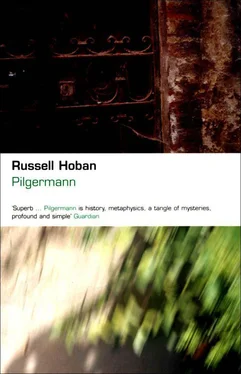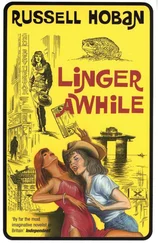Russell Hoban - Pilgermann
Здесь есть возможность читать онлайн «Russell Hoban - Pilgermann» весь текст электронной книги совершенно бесплатно (целиком полную версию без сокращений). В некоторых случаях можно слушать аудио, скачать через торрент в формате fb2 и присутствует краткое содержание. Год выпуска: 2002, Издательство: Bloomsbury Publishing PLC, Жанр: Современная проза, на английском языке. Описание произведения, (предисловие) а так же отзывы посетителей доступны на портале библиотеки ЛибКат.
- Название:Pilgermann
- Автор:
- Издательство:Bloomsbury Publishing PLC
- Жанр:
- Год:2002
- ISBN:нет данных
- Рейтинг книги:5 / 5. Голосов: 1
-
Избранное:Добавить в избранное
- Отзывы:
-
Ваша оценка:
- 100
- 1
- 2
- 3
- 4
- 5
Pilgermann: краткое содержание, описание и аннотация
Предлагаем к чтению аннотацию, описание, краткое содержание или предисловие (зависит от того, что написал сам автор книги «Pilgermann»). Если вы не нашли необходимую информацию о книге — напишите в комментариях, мы постараемся отыскать её.
Pilgermann — читать онлайн бесплатно полную книгу (весь текст) целиком
Ниже представлен текст книги, разбитый по страницам. Система сохранения места последней прочитанной страницы, позволяет с удобством читать онлайн бесплатно книгу «Pilgermann», без необходимости каждый раз заново искать на чём Вы остановились. Поставьте закладку, и сможете в любой момент перейти на страницу, на которой закончили чтение.
Интервал:
Закладка:
Passover has come and gone and the Franks have not come over the walls. The tower we call Evil Eye and Raymond’s tower and Tancred’s tower stare at us through days and nights as if by observation could be known the time when Antioch must fall to these soldiers of Christ who cannot breach the walls of Justinian.
The towers stare, the Franks await God’s will while Karbuqa masses his armies and the reports of his imminent advance come every day with fresh detail and greater numbers. In Antioch the feeling is that of a very long night almost over and daylight almost here. The walls have not been breached, the Franks for all their engines of war and their will of God have not been able to bring the outside into the inside. Some of the people who have crept away from the city now return to take up life and business where they left off. There are many difficulties, many hardships, there are not enough goods to do much business with, but the people of Antioch wait patiently for the city to outlast its besiegers.
April passes and May. Salzedo was wrong: Shavuoth has come and gone and Antioch has not fallen. Here is the beginning of June in the Christian calendar, the end of Sivan in the Jewish one. The new moon of Tammuz will soon be seen, and some of the more old-fashioned Jews of Antioch will address it in the old-fashioned way:
As I dance towards thee,
but cannot touch thee, So shall none of my evil-inclined enemies
be able to reach me.
It is the night of the last of Sivan. I am asleep and I know that I am asleep. I feel like an instrument, like a compass needle quivering to the pull of the north or like a weathercock — yes, that’s how I feel, like a weathercock high, high up on a steeple in a strong wind, my limbs rigidly extended north, south, east, and west but not fixed and still like the directionals of a weathercock; no, I am spinning, spinning through the space called time, over the miles, over the days, weeks, months to the fall of Jerusalem a year from now. My hands and feet burn as if they are on fire, spinning so high in a purple-blue sky, spinning down to the domes of Jerusalem the golden, down to Yerushalayim in the Christian summer of 1099, down to Yerushalayim with a pall of smoke hanging over it and a stench of fire and blood and death.
It is only a little while since the city has been taken, fires are still burning; the streets are slippery with blood and entrails; bodies of men, women, and children, severed limbs and heads are heaped everywhere. The colours of the clothes on the bodies cannot be distinguished, so steeped in blood are they. Some of the bodies still move a little, and groans can be heard.
Many of the Franks are busy with the dead and the near-dead; they cut them open and pull out the entrails, in this way some of them find gold coins. Screams are heard as well as groans, some of the Franks are active with women whom they have not yet killed while others take their pleasure with the dead.
Over the city circle the vultures while crows, bolder and more nimble, hop and flutter with red beaks and feet, picking and choosing. Dogs go cringing with their ears laid back, they seem stricken with guilt and terror at seeing so many masters slain at once; some are in an ecstasy of blood-frenzy, they snarl and growl and tear at the dead flesh, the corpses flop and jerk as they are pulled this way and that.
Here are the Western Wall and the Temple mound with the Dome of the Rock and the al-Aqsa Mosque. I have never seen these places before but I know them from maps and pictures, from dreams and from the phantom Jerusalem I have seen on Hidden Lion. Blood runs down the stones of the Western Wall and in the heat of the day the air quivers and sways above the dead who are heaped between the Dome of the Rock and the al-Aqsa Mosque. These are mostly Muslims; I can see no Jews here but I can smell their death in the smoke that rises from the synagogue to which they fled and in which they have been burnt alive. I am not walking, I am moving on the air in this waking sleep-travel, this night journey to a day that is coming; if I had to walk I should find little space on the red and slippery stones, I should have to walk on corpses.
Now I see among the blood-soaked bodies one that is like a naked ivory goddess in this butchery-place of the soldiers of Christ. The back of her head is crushed; her flawless limbs are sprawled in dishonour — but I am wrong to say that: her beauty of self and person cannot be dishonoured; she has been violated and murdered but such as she cannot be dishonoured; those who have done this have dishonoured only themselves. Here she lies, my dead and naked pilgrim, her Arab gown torn from her; flinging it over her head was not enough, they had to see all of her. I cannot cover her nor can I more modestly dispose her limbs, I have no corporeal existence in this place to which I have spun with burning hands and feet.
Here is a strange thing: in Sophia’s left hand is a little shoe, a little scarlet slipper worked with gold. A child’s shoe. Now do I seek and search, powerless to move so much as a dead finger of the numberless dead who lie here bearing witness.
I seek, I search; crows flap their black wings and cry their carrion-lust, dogs growl at my strange presence as I look everywhere to see if there will be a live two-year-old child with one foot bare. Have I been brought here to see the end of Sophia and that alone?
The sun goes down; the crows depart; the dogs are bolder now, the smacking and slavering and crunching of their feasting is loud in the twilight. There! Something moves! Fouled with the blood of the corpses he has sheltered under, there crawls out of this midden-heap of history a boy of perhaps two years and a few months. On his left foot is the mate of the slipper in Sophia’s left hand. A fine boy, big for his age and strong-looking, with a face like Sophia’s. It is growing dark, there is no moon to be seen. The little boy is not crying, his eyes are open wide and all his senses are alert as he walks slowly and quietly among the silent dead and the snarling dogs.
I cannot follow. My burning hands and feet, my north and south, east and west are spinning me up into the night and away from Jerusalem. ‘My son!’ I cry, ‘My little son!’ Never shall I know his name. His face was not only like Sophia’s, there was something of me in it as well, also in the way he held his head.
I am in my bed. The last of the darkness is paling towards the dawn. My hands and feet still burn. I am naked. I look away from my mutilation and cover myself. At the foot of my bed stands my young death, naked but complete. For the first time his face is not obscure, and I see that it is like Sophia’s face and yet it is my face too, the face of my child’s soul grown into a better man than I ever was. Still I can’t be such a bad fellow to have a death like this. He points to my hands and feet and I see there, written on the palms of my hands and on the soles of my naked feet, the four characters of the unutterable name of God.
He has done this for me, my young death: by writing on my hands and feet the sacred name he has sent me through the space called time to the taking of Jerusalem and the death of Sophia to show me our son walking alive out of the slaughter. Perhaps he will live only one day more, perhaps only one hour more, but he will begin his journey and will have in his eyes for however little time the same world that burned in the vision of his mother and his father. My son! Never to know his name! As I look at my hands and feet the letters fade with the paling of the sky. My night journey is done.
Now the cool dim tones of light that every morning build afresh the world are building it again this morning; the houses and the domes and minarets, Justinian’s walls and towers all stand up in readiness for their dayward passage. Now appear before me, consubstantial with the light, the dead fellow-travellers of my pilgrimage in the order of their deaths: the tax-collector, headless and naked and writhing with maggots; Udo the relic-gatherer whom I killed in the little wood; the bear shot full of arrows by the man who called him God; Bodwild the sow and Konrad her master; the pilgrim children raped by Bruder Pförtner and his fellows — they must have perished at sea, they are bloated and eyeless, their hair is matted and tangled. My young death, respectful and attentive, stands a little to one side. His lips are moving, they shape the word, ‘Tonight’.
Читать дальшеИнтервал:
Закладка:
Похожие книги на «Pilgermann»
Представляем Вашему вниманию похожие книги на «Pilgermann» списком для выбора. Мы отобрали схожую по названию и смыслу литературу в надежде предоставить читателям больше вариантов отыскать новые, интересные, ещё непрочитанные произведения.
Обсуждение, отзывы о книге «Pilgermann» и просто собственные мнения читателей. Оставьте ваши комментарии, напишите, что Вы думаете о произведении, его смысле или главных героях. Укажите что конкретно понравилось, а что нет, и почему Вы так считаете.












